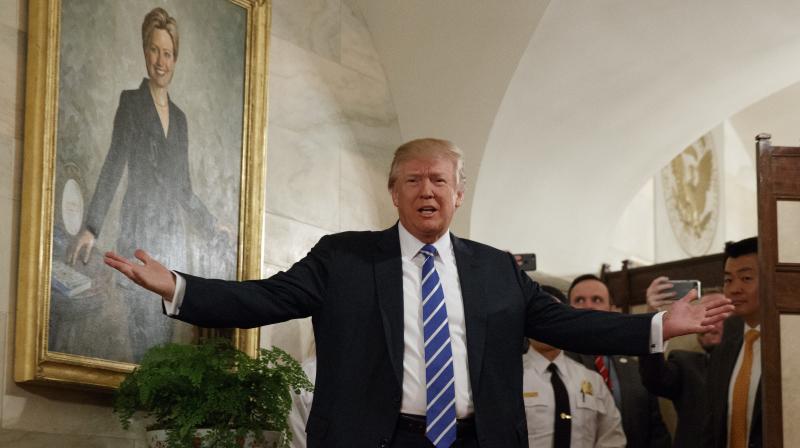Why the fuss about Trump and Russia?

It is a strange anomaly. Whenever India or Pakistan, or both, go into cobra pose, threatening to decimate each other, the world cries foul.
When Nawaz Sharif visits Delhi or when Narendra Modi drops in uninvited at a Lahore wedding, Indian and Pakistani peaceniks applaud. Yet, when Donald Trump wants to improve his country’s troubled relations with Vladimir Putin he is pilloried for even making the suggestion.
Granted he is not gender sensitive, and his mindset is possibly racist. I would liken Russia in this equation to the baby in Trump’s dirty bathtub. The deep state that contrived lies to invade Iraq or exulted in the wrecking of Libya, in cahoots with the media, seems to be facing an existential crisis with Trump’s presidency over his plans to touch base with Putin. One day Trump excelled himself in his collaring of the deep state, which includes all major parties and the media. He said something to the effect that his country’s image was not exactly squeaky clean when it came to shedding blood around the world. That was his response to a Fox TV question about Putin’s alleged bloodlust in Aleppo.
Trump’s criticism of his country’s savagery has been at par with Reverend Jeremiah Wright, the priest who baptised Obama’s children. When in a fit of rage over an Israeli assault on Palestinian camps he yelled “goddamn America” Obama cut off ties with the African-American priest.
Then suddenly it began to rain scams on Trump. So and so met the Russian ambassador. Trump’s attorney general is said to have a racist background. That was forgiven. Instead his alleged dalliances with Russian diplomats and/or businessmen were picked up for censure. A wider conspiracy was unleashed to torpedo the new President’s still unwavering plans to improve relations with Putin. BBC dug out dirt on the Russians.
Cut to the day when Prime Minister Theresa May sauntered into Washington and Ankara recently and the media said she was fixing business deals. They omitted the fact that both her destinations involved allies who seemed to have lost interest in the old British fear-mongering called Russophobia. Trump’s fascination with Putin was by now legendary and Turkey’s President Erdogan too had shown signs of becoming disenchanted with the British-assigned role of playing an anti-Moscow Sancho Panza.
Russophobia is a British innovation. It was left to Winston Churchill to give the Cold War a newer variant of an old pursuit. The new seeds were planted in Churchill’s Iron Curtain speech. Then James Bond took over while Alfred Hitchcock also embraced the diabolical imagery of the Russians. Until then, Hollywood had been in hot pursuit of Germans.
Much earlier, before Western democracies were swamped with the Churchillian exhortations against Russia, British governors general and viceroys in India took it upon themselves to deepen fear mongering. Delhi’s imposing colonial monument — India Gate — is a testimony to this perpetually induced fear with the rulers of Moscow. All sides of the landmark sandstone monument are lined with thousands of names of Sikh and Muslim soldiers who were sacrificed in the suicidal Afghan wars.
Going by usually trustworthy accounts Trump is an unpredictable person, which makes him a dangerous leader of an already error-prone military power. Nevertheless, Noam Chomsky must have shocked the Democrats by suggesting that John Kennedy was the most dangerous of Presidents. Trump is lampooned daily as an unqualified gatecrasher in the White House. The suggestion, however, implies that the world was somehow better off under George W. Bush and, more worryingly, under his colleagues — Donald Rumsfeld and Dick Cheney. Is Trump really worse than the marauders of Iraq and Libya?
By arrangement with Dawn

